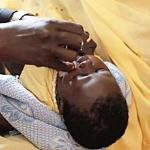Vaccines against rotavirus, a leading cause of diarrhea-related deaths among young children, first became available in 2006. However, a new study indicates vaccination has been slow to blunt the spread of the infection.

GAVI / Youngblood
A Sudanese child receives the rotavirus vaccine.The study combines findings from numerous other studies as well as data collected in a World Health Organization-coordinated program, the Global Rotavirus Surveillance Network.
Study co-author Umesh Parashar, of the U.S. Centers for Disease Control and Prevention (CDC) says rotavirus infection is common throughout the world.
But he points out that children in richer countries usually get proper treatment if they get sick.
"In contrast, in developing countries, you get a lot more fatal outcomes," he says. "And this latest analysis that we have just completed, indicates there are about 453,000 deaths from rotavirus diarrhea globally."
Of the nearly half-million rotavirus deaths each year among children younger than age five, India alone accounted for almost 100,000. Add in Pakistan, Nigeria, Ethiopia, and the Democratic Republic of the Congo, and those five nations account for more than half the rotavirus deaths worldwide.
Researchers wanted to establish a baseline of rotavirus-related deaths prior to the introduction of vaccines, which were licensed in 2006 but were just starting to be used in the timeframe covered by the study. Vaccinated populations were not included in this study.
Parashar says the vaccines were initially limited to more developed countries, because more testing was needed before they could be used in resource-poor settings.
"In 2009, we actually had data available from these clinical trials in Africa and Asia, and then the World Health Organization expanded to a global recommendation for rotavirus vaccines. So the vaccines are just about to be rolled out over the next two years."
The authors of this new paper say that as the vaccine is rolled out in the developing countries, rotavirus-related deaths should be substantially reduced.
"And so it really highlights the need to introduce these vaccines so we can really reap the full reward of vaccination in reducing diarrheal mortality."
Umesh Parashar and colleagues published the results of their study online in The Lancet Infectious Diseases.